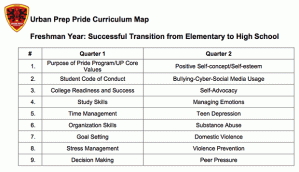Group Support for Social and Emotional Learning
SEL classes foster skills that help students navigate high school—and their lives outside of it.
Your content has been saved!
Go to My Saved Content.Overview
At Urban Prep Charter Academy for Young Men, Englewood Campus, an all-black, all-male, 9-12, Title I school in Chicago, Illinois, the curriculum includes a daily social-emotional class, Pride. Each student is part of a small cohort that stays together throughout their four years at Urban Prep. "You're with them from freshman to senior year," says Toy, a 10th-grade Urban Prep, Englewood Campus student. "These are actually my brothers, people that I can lean on if I need something.”
At Urban Prep:
- Students are admitted via lottery; 85% qualify for free and reduced lunch, and over 20% are diverse learners -- students with disabilities.
- 100% of students are accepted by a four-year college or university, and 94% enroll in college.
"There are no limits to how many things you can do if somebody believes in you," says one Urban Prep, Englewood Campus student.
How It's Done
Build Relationships With Your Students
Throughout their four years, each Urban Prep student is part of a small cohort known as a Pride. "We're Urban Prep lions, and lions travel in prides. So we have our students grouped according to Prides," explains Tim King, Urban Prep Academies' founder and CEO.
Urban Prep, Englewood Campus has four Pride leaders, similar to counselors, one for each grade level -- and they all have a background in social work. Each Pride leader teaches four to six daily classes of about 20 students, and each Pride is named after one of their core values: relentlessness, integrity, solidarity, accountability, selflessness, and resilience.
Students stay with the same Pride leader throughout all four years of high school, creating a consistent relationship and support person that they can count on.
"We're the one person in the building that will remain consistent from freshman year until graduation that will know about their familial situations and the challenges that they've had academically," says Marcus Moore, an Urban Prep, Englewood Campus, 10th-grade Pride leader. "Research indicates that relationships are a key factor in helping young men be successful in school because they feel that they have someone in the building that they can trust, that they can go to, and who will advocate for them."
"Going to Pride every day does something for me that no academic class can do," says Deveon, a 12th-grade Urban Prep, Englewood Campus student. “It's like a second home to come in and be able to talk about anything so I don't have to hold things in all day long.”
Create a Pride Curriculum
In past years, Pride was more like a free period, similar to a study hall. This year, the staff has created a framework of topics to help guide their weekly lesson plans.
"We developed a framework, and we're building the curriculum this year as we go along," explains Moore. Urban Prep, Englewood Campus is part of a network of three schools, Urban Prep Academies, and Pride leaders from all campuses meet by grade level to develop their curriculum.
"What we are identifying are evidence-based interventions that have been proven to work for other schools, but we've not found anything that specifically meets the needs of urban youth in an all-male school,” adds Moore. “That's what we're building right now."
Teachers meet periodically with their grade-level Pride leaders to discuss:
- What did and didn't work well in their curriculum
- What should be removed and added to the curriculum
- Trends related to students’ current social and emotional struggles across all three campuses
- Strategies for engaging students in personal and difficult conversations
- Ways to partner with outside agencies to strengthen the Pride program
When developing curriculum, teachers focus on the specific needs that affect their students. "We understand that students need math, science, and English, but when you come from environments that lack resources, that lack opportunities, that have a lot of crime, and when your students deal with a lot of trauma, they also need skills to navigate that,” explains Moore. “It's difficult to ask a young man to sit and focus in a biology class or a chemistry class if they're hungry, if they're worried about where their mom is, or if they're worried about coming to and from school when they have to cross gang lines.” The staff at Urban Prep looks at their students' experiences and needs, incorporating them into their Pride curriculum to help these young men better navigate their situations in and outside of school.
Create Weekly Lessons That Speak to Your Students' Needs
Each grade level has a different Pride theme broken down by weekly lessons in their curriculum map (PDF):
- Freshman year: successful transition from elementary to high school
- Sophomore year: identity development and self-awareness (PDF)
- Junior year: college readiness
- Senior year: college success
Each week, the lessons focus on a new theme, such as organization, decision-making skills, self-esteem, stress management, and racism.

Initiate Difficult Discussions Through Engaging Activities
Urban Prep engages their students in discussing difficult topics through activities that create a safe space for sharing their feelings.
In Moore's 10th-grade Pride class, at the end of the stress management unit, he asks his students to write down one thing they learned about stress from the week's discussion -- without signing their names. His students share things like:
To get rid of their stress, students stand up, crumple their paper into a ball, and throw it. Everyone then picks up a ball and takes a turn reading what an anonymous classmate wrote. "We're able to have fun, laugh, and be loud so we can actually have that discussion about stress," says Moore.
Create Discussion Questions for Each Class
Each class includes an essential question, a do-now, and an exit ticket. The essential question is broad and related to the week’s theme. Gregory Sashington, an Urban Prep, Englewood Campus Pride leader, alumni, and assistant dean, offers an example question: "Why are we angry? Why, as black men, are we mad?"
The do-now is more specific and helps students to think critically, says Sashington, giving this example: "'What angers you about society?' And then the exit ticket would be, ‘Can you admit that you’ve been hurt? If so, how?’ The exit ticket causes them to reflect. It causes them to think back on their own lives."
To get his students comfortable with sharing their experiences and feelings, Sashington shares his personal experiences with his students: "Many of you all know that I had a brother that passed in February due to gun violence. I had to make a decision. Do I make this anger constructive or destructive?"
Be Real With Your Students
To get your students to a place where they feel comfortable opening up to you and to the class, you need to be open and real with them. "I'm not afraid to be open. I'm not afraid to speak out my emotions or things that I've dealt with, things that I've had trouble with, things I couldn't quite figure out," says Sashington.
By modelling that you’re OK with experiencing and sharing your emotions, you show your students that it's OK to do the same. "It wasn't like this since the first day of class,” observes Sashington, “but because I continue to be steady and consistent with this, they're now opening up, and I'm seeing the progress.”
"If we really care about academic development, we have to care about social and emotional development," states Lionel Allen, Urban Prep Academies' chief academic officer. ”You can't have one without the other. Our students, through our Pride program, and through the fact that we provide them with those noncognitive skills, they're able to apply to college, be accepted, and once they get there, they persist.”
